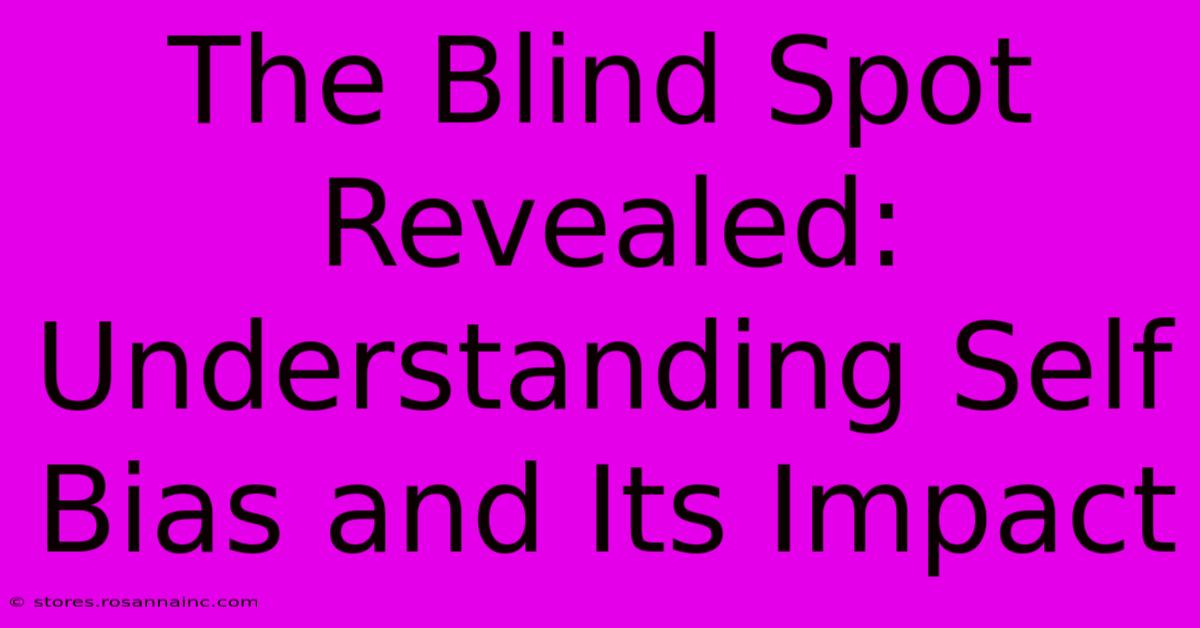The Blind Spot Revealed: Understanding Self Bias And Its Impact

Table of Contents
The Blind Spot Revealed: Understanding Self-Bias and Its Impact
We all like to think of ourselves as objective, rational beings. But the truth is, we're all susceptible to self-bias, a pervasive cognitive distortion that significantly impacts our decisions, relationships, and overall well-being. Understanding self-bias is the first step towards mitigating its negative effects and fostering more accurate self-perception.
What is Self-Bias?
Self-bias, also known as self-serving bias, refers to the systematic tendency to perceive oneself favorably. This isn't simply healthy self-esteem; it's a cognitive distortion that leads us to attribute our successes to internal factors (like skill or talent) while blaming external factors (like bad luck or other people) for our failures. This cognitive bias manifests in numerous ways, subtly shaping our perspectives and actions.
Common Types of Self-Bias:
- Illusion of Superiority: This is the belief that we are better than average in various aspects, often overestimating our abilities and underestimating others'. It's a common example of self-enhancement bias.
- Self-Serving Attribution Bias: As mentioned above, this involves taking credit for successes while deflecting blame for failures. This bias protects our self-esteem but can hinder personal growth and accurate self-assessment.
- Optimism Bias: This is the tendency to overestimate the likelihood of positive events happening to us and underestimate the likelihood of negative events. While a degree of optimism is healthy, excessive optimism can lead to poor decision-making and unpreparedness for potential setbacks.
- Confirmation Bias: This involves selectively seeking out information that confirms our existing beliefs and ignoring information that contradicts them. In the context of self-bias, this might involve only paying attention to feedback that supports our positive self-image.
- Dunning-Kruger Effect: This refers to the phenomenon where people with low ability in a specific area overestimate their competence, while those with high ability tend to underestimate their competence. This highlights the often-invisible nature of self-bias.
The Impact of Self-Bias:
The consequences of unchecked self-bias can be significant and far-reaching:
- Impaired Relationships: Self-bias can make it difficult to empathize with others, leading to conflict and strained relationships. Constantly focusing on one's own perspective can damage communication and understanding.
- Poor Decision-Making: Overestimating our abilities and underestimating risks can lead to poor choices with significant consequences. The optimism bias, for instance, can lead to inadequate preparation and risk management.
- Hindered Learning and Growth: If we attribute failures to external factors, we miss valuable opportunities for self-reflection and improvement. This prevents us from learning from our mistakes and growing as individuals.
- Increased Stress and Anxiety: The constant need to maintain a positive self-image can be stressful and lead to anxiety when faced with challenges or negative feedback.
Overcoming Self-Bias:
While completely eliminating self-bias is likely impossible, we can actively work to mitigate its impact:
- Seek Objective Feedback: Actively solicit feedback from trusted sources and be open to constructive criticism, even if it's difficult to hear.
- Practice Self-Reflection: Regularly engage in self-reflection to identify potential biases in your thinking and decision-making. Journaling can be a helpful tool.
- Challenge Your Assumptions: Actively question your own assumptions and beliefs. Are you truly as good as you think you are in a particular area?
- Develop Emotional Intelligence: Improving your emotional intelligence can help you better understand your own emotions and the emotions of others, fostering empathy and reducing self-centered thinking.
- Embrace Failure as a Learning Opportunity: View failures not as personal failings, but as opportunities for growth and learning. Analyze what went wrong and adjust your approach accordingly.
Understanding and addressing self-bias is a crucial step towards personal growth, improved relationships, and more effective decision-making. By acknowledging our inherent biases and actively working to mitigate their influence, we can cultivate a more accurate and balanced self-perception, leading to a more fulfilling and successful life.

Thank you for visiting our website wich cover about The Blind Spot Revealed: Understanding Self Bias And Its Impact. We hope the information provided has been useful to you. Feel free to contact us if you have any questions or need further assistance. See you next time and dont miss to bookmark.
Featured Posts
-
The Myth Of Objectivity The Unexpected Role Of Self Bias
Feb 04, 2025
-
Essential Guide Choose The Perfect Flowers For Mothers Day 2023
Feb 04, 2025
-
Maximize Your Online Workspace The Genius Settings Every Power User Needs
Feb 04, 2025
-
Embody The Night Discover The Enchanting Allure Of Nightrider Green For D And D Nails
Feb 04, 2025
-
From Ordinary To Extraordinary The Magic Of Props In Portraits
Feb 04, 2025
